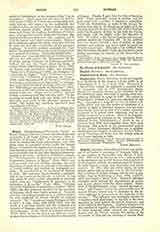

Dupin, PIERRE-CHARLES-FRANCOIS.—known as BARON CHARLES DUPIN, a French mathematician and economist, b. at Varzy, Nièvre, October 6, 1784; d. at Paris, January 18, 1873. At the age of twenty-three he entered the Ecole polytechnique, and after three years of successful studies under the famous Monge, he received the degree of naval engineer. He then served in that capacity in the navy and showed so much ability that he was later appointed inspector-general of the navy. In 1813 he published a pamphlet, “Développement de géométrie pour faire suite à la géométrie pratique de Monge” (Paris, 1813), containing many new and brilliant theories, the most important of which were one relating to the indicatrix of curved surfaces and another on orthogonal surfaces. He was elected to the Academy of Sciences in 1818. The next year Dupin received a professorship at the Conservatoire des arts et métiers; during this period he wrote various pamphlets on scientific topics, such as: “Applications de géométrie et de mécanique à la marine” (Paris, 1822); “Diverses legons sur l’industrie, le commerce, la marine” (Paris, 1825), and also numerous memoirs for the Academy of Sciences, which were highly spoken of. Notwithstanding his brilliant prospects as a mathematician, he soon preferred to devote himself to political economy. His “Voyages en Grande Bretagne de 1816 à 1819” (6 vols., Paris, 1820-1824), which were the result of a personal inquiry into the commerce and industry of England, placed him in the foremost rank of statisticians. In his “Carte de la France éclairée” (Paris, 1824), he was the first to use different colors to show the development of education in various parts of France. Charles X gave him the title of baron in 1824. Dupin gradually turned to politics and for forty years was a member of legislative assemblies. Under the Restoration, in spite of the honor bestowed upon him by the Bourbons, he sided with the Liberals and took his seat at the Left of the Chamber; under the Monarchy of July, he sat with the center, and finally with the Right, under the Republic of 1848. He rallied to the Second Empire and was appointed senator by Napoleon III. In his political career he showed himself a man of ability, of great industry and activity, and never failed to assert his Catholic convictions. Although a less brilliant man than his brother the Elder Dupin, he may have a more lasting reputation on account of his discoveries in geometry.
LOUIS N. DELAMARRE

